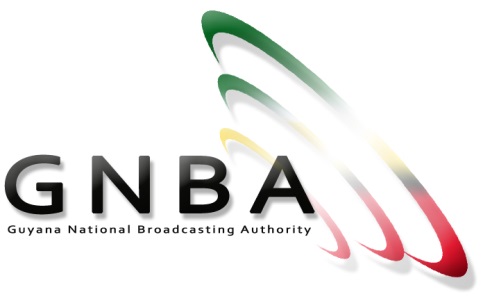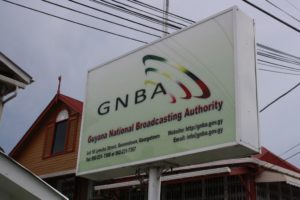Press Release
NOTES OF MEDIA BRIEFING HELD ON MAY 17, 2019
GNBA REFUTES “REPORTERS WITHOUT BORDERS” ASSESSMENT OF GUYANA WITH RESPECT TO THE RESTRICTION OF FREEDOM OF EXPRESSION.
The Guyana National Broadcasting Authority (GNBA) takes note of a recent mischievous report carried by the Guyana Times Newspaper of April 21, 2019 purportedly taken from the 2019 Reporters without Borders (RSF) index on press freedom in countries worldwide. In as much as the report indicated that Guyana moved from position 55 to 51 on the index, the assessment of Guyana is spurious especially as it relates to the “media regulatory authority.” The GNBA regards this as a reference to the Authority and seeks to set the record straight.
First the GNBA is an authority created by the Broadcasting Act passed by the Parliament of Guyana in 2011 and assented to by the then President of Guyana Mr. Bharrat Jagdeo. Members of the governing board of GNBA are appointed by the President according to the Act but are not necessarily selected by the President indeed one member of the Board has a statutory place by virtue of his office that is the Head of the National Frequency Management Unit or its successor and one member is nominated by the Leader of The Opposition. The other five members of the Board are drawn from persons within the society at large who have experience in at least one of the following areas that is to say Information Communication Technology; Broadcasting; Law; Performing Arts; Literature; Science; Finance; Accountancy; Administration; Public Service; and be of good standing, integrity and character.
It is a Non Sequitur to contend that the provision which allows the President to appoint the Board Members “restricts the freedom of certain media outlets” The GNBA calls out the RSF to point to a single instance between 2015 and 2019 where any media outlet was denied a Licence by the GNBA for Radio, Television or Cable Broadcasting or where and when the Licence of any Broadcasting entity was suspended or was subjected to prosecution.
The information presented in the article appears outdated and/or archaic. It is not in keeping with the progress made in the broadcasting landscape in Guyana. The GNBA functions independently, with the power vested in its governing Board to issue Radio, Television and Cable licences on the basis of potential broadcasters, having met the requirements for a broadcast licence; and availability of spectrum space.
The GNBA functions as a non-partisan, impartial and professional body that is free of government intervention, with respect to the issuance of licences. The GNBA functions within the ambits of the broadcasting legislation and holds licenced broadcasters accountable for breaches of the Broadcasting Act especially with regard to the Broadcast Policy as set out by the Act.
The GNBA between 2015 and 2018 held several engagements with broadcasters in the first instance to advise the Prime Minister on necessary amendments to the Act which were completed in 2017 and in other instances to formulate the Guidelines for Broadcasters. Several other consultations are planned for the next two years in keeping with the Authority’s Strategic Plan. The Authority continues to renew the licences of existing broadcasters, once they have met their obligations to the Authority. In addition, the Authority continues to issue broadcasting licences.
GNBA challenges “Reporters without Borders” to show an instance where any journalist was put before the court for reporting anything against the government. Today, GNBA has systems set up and ratified by its governing Board to examine the actions of our broadcasters, before arriving at a decision whether to revoke, suspend, reduce the timeframe of a licence or impose a fine, as outlined in the Broadcasting Act. Importantly, there is the Monitoring and Compliance department which monitors the airwaves and when certain infractions are identified, those infractions are forwarded to the Special Investigative Committee for further examination. If it is decided that a fundamental breach was committed against the broadcasting Act, that broadcaster is summoned for a preliminary interview, where an opportunity is given for the broadcaster to refute or acknowledge the charge brought against his/her station.
Further, following that preliminary interview with the Special Investigative Committee, recommendations are made as to whether the broadcaster should be brought before the Hearing Committee or the Board. GNBA wishes to highlight that citizens can and do make complaints of infractions by broadcasters. GNBA will soon be institutionalizing the concept of Citizen Monitoring. The Authority will also be developing a Research Department which will survey listenership, quality of programmes, do content analysis, and assess levels of infractions among other things.
It is important to note that GNBA will soon be placing certain errant broadcasters before the court. In fact, the Authority has already contacted its lawyer to move ahead with litigation against certain broadcasters. Persons will not be placed before the court for broadcast content. However, those broadcasters who never had a broadcasting licence and are broadcasting, whose licences have expired and have not renewed their licences but are still broadcasting and those who owe the Authority millions of dollars and are refusing or failing to pay, are the ones that will be brought before the court.
GNBA continues to function as a professional entity and within the parameters of the broadcasting legislation.
# # #



